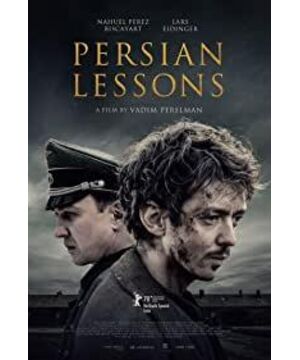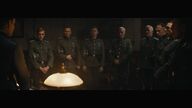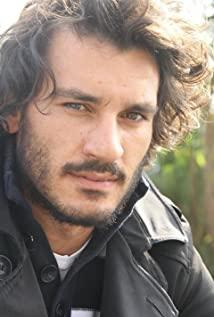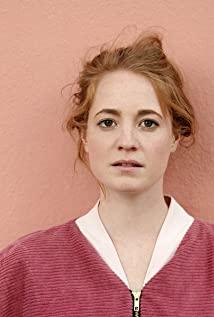"Persian Lessons" Starring Interview: Navel Perez Biscayatt
Original link?
https://www.goldenglobes.com/articles/nahuel-perez-biscayart-somos-los-mismos-en-diferentes-contextos
(Because of my limited level, this article is translated in Spanish)
Earlier this year, he landed at the Berlin Film Festival with two films that were not too different from each other. On the one hand, he is the protagonist of Vadir Perelman's "Persian Lessons," in which he plays a Belgian Jew who pretends to be a Persian in a WWII concentration camp so that they would not have killed him, which not only saved his life but he was the guardian and protégé of the German commander played by the brilliant Lars Eidinger. The German-language film has just been released in Germany and has already been released in the United States. But in addition to that, Nahuel Pérez Biscayart's film also marked his return to cinema (Argentina), which marked his return to cinema. He joined forces with Natalia Meta to share posters on El profugo with Cecilia Roth, Daniel Hendler, Erica Rivas and Mirta Busnelli. From his home in Paris, Bésé César (beats per minute) and the Silver Condor winner of Tattooed explains to us why, despite the awards and recognition, he was a boy who dreamed of becoming an inventor and found himself. Came into the theatre by accident at an industrial school in Buenos Aires.
How alienating is it for you to be obsessed with this World War II story?
I don't know if it's alienating, but it's powerful. We shot the film in an abandoned shack in a small town called Bobruisk in southern Minsk Oblast, in heavy snow and under the sky, with temperatures below minus 15 degrees. On its own, the background is very complex, which adds to the theme of the movie and, of course, makes the whole experience quite intense. To make matters worse, we later found out that the place we were filming was once a Stalinist internment camp, and over the long days of filming we learned stories that also started to get interesting and intensified everything. Luckily, I was surrounded by a great team and shared the scene with the super cast. Belarusians are little machines that work with people, very warm and very positive. As you can imagine, the context isn't very interesting, but the elegance of the performance is also that it puts itself in those places, knowing that it's an intense experience that lasts a certain amount of time.
Did you feel lucky to be born in another era after the movie was made?
Absolutely, but I've always thought so, and I want to tell you that even for people born after 1983, I've been very lucky. And of course there's also a film that takes place in Europe, in a place that seems so far away, and when you're so preoccupied with trying to get close to what might happen, it ends up reaffirming a lot of things about democracy, albeit they work pretty badly , cannot be compared to the horrors experienced by many.
We don't know much about your character because he needs to lie all the time to survive. How did you connect with him? What was it like to build it?
Aside from the difficulties we're talking about, which has to do with the tragic setting of the story, it's very difficult to face the character because he's not an SS officer, and we know which side and what it's on, aside from his vicissitudes and subtleties aspects of the role it will play. When one has to play a role-playing role, the possibilities and assumptions of explanation multiply. Playing a character who lives in fear and invents another personality in order to survive means asking yourself a question in the order "How does this character perform?", "How good is his lie?": Fear Will you see him? , "When can I show it and when not? ", "If I show a lot, the SS will find me and kill me", "If I don't show it, the public will just say the boy is very calm and doesn't see him in danger" and then have to constantly adjust The knobs are very sophisticated to find little behaviors that can connect with the public as well as with my enemies without giving up on me.
You've worked in German, but how much do you really know the language? Have you ever explained to me that you first made a movie in French and then learned it.
Yes, with the Germans, I am heading towards this goal. I would like to study more deeply, but I will tell you a story, this summer I was invited at the Festival Music Festival in Salzburg, a very prestigious theatre festival, where last year's Nobel Prize winner Peter Winner of the Literature Prize for the last play performed by Peter Handke. They saw me in a Persian class and thought I spoke German well, they sent me Handke's text, which was crazy because Handke wrote half a page in more complicated German than him , with only a little dialogue, even for the Germans. myself, but I was inspired and did it. So now I can tell you that making a movie in German is like going to buy a kilo of potatoes, it's simple without exaggeration, but the complexities I've experienced at work have taught me a lot more about the language. I don't speak German, I understand 60% or 70%, sometimes 100% throughout my work, but my pronunciation is good and people understand me well. I'm passionate about acting in this language, I love it, it's another character I found in "Nahueles".
In the middle of these scenes, you're playing a Belgian who speaks German, who was originally in France but is actually in Belarus, and the Argentine pinches himself and says, "What the hell am I doing here?"
My Argentina is like it comes and goes. Sometimes I find it a little difficult to piece together certain sentences in Spanish. Navel is no longer Argentine, he is a deformed person, a chimera with no place and no origin, but obviously there are a lot of things that remind me of my childhood, everything is mixed and beautiful. But if you didn't believe it, I wouldn't know... When things are going well, you feel good about what you do and grow, meet people who inspire you, do good things within your power , which seems to me, you don't have to do much problem.
In Persian Lessons, this is the kind of card game your character plays with Lars Eidinger, a hugely talented actor. How does it feel to play this game with him, considering he's been winning medals all the time?
Fun! I admit that when they told me who the possible actor for the role in the Persian class was, I said "if it was Ras, I wouldn't hesitate to do it" because I felt like we could understand each other, the truth is That way, we understand each other and we have fun. In fact, everything you see in the movie happens behind the camera too. If I forwarded you the audio we exchanged at three in the morning and I taught him to speak fake Persian, you might notice. Lars took his German text and he had to learn Persian so I could record it for him. When I have questions about how to pronounce it in German, he sends me audio in that language. I feel like Lars' character Koch and Lars himself being an actor and being able to do more of what he wants, it's hard because he's confirmed by an absolute position of power, because Sometimes I feel very handicapped or handicapped at the level of my character's expression because I have to embody someone who is constantly being observed and judged, basically Russ' character has been with him all the time to see if he's good or bad. It's kind of like a really fun dual game, and sometimes I end the day very nervously to explain life and death scenarios, but it's a very informative round trip. When we showed the film in Berlin, it was pretty crazy, people were laughing out loud in the biggest tension, and I think we enjoyed that because in the midst of that tragedy and the weight of it,
At that Berlin Film Festival, you brought two films, a co-production in German, and an Argentine film that I think is your return to the country, right?
Yes, because I haven't shot there in 4-5 years.
What's the experience of an actor who has returned to work in your country, but has already achieved great success in Europe and won the César in cinema?
No, that's what people want to believe, but nothing has changed, I've only spoken a few languages, and I've been through it. Going back to acting with the partners you already know, like Cecilia (Ross) and Daniel (Hendler) with whom I've already worked, where I met Erica (Rivas), that's really It was so beautiful and we became very close friends. We are all the same in different circumstances, and we do things with the love that we always have. Maybe change is more stressful for a person and that's what I need most because while outsiders see awards, success, red carpets, sometimes the obstacles are more difficult than knowing how to deal with them . Don't drown.
Is interpreting a character in Spanish (one of your languages) the same as interpreting it in German in Belarusian or acting?
This is a difficult question. Acting is acting, but for the past 9 years, I've made films in various languages, and acting is not just acting, but knowing and learning new languages and sounds. So if the concept of acting becomes more complex for me, it's not pure lax native and free entertainment. In retrospect it was a mix of technology and finding games, but the magic I found or sent me was that through those weird sounds, there was also motivation and emotion when performing, and because they didn't have any connection to my native language , so the historical burden, the physical burden, and the prejudice is reduced, so I've also started to see it as a disguise, because another language is also a freer way to work. I admit that when I had to act in Spanish again, sometimes I couldn't hear myself because I had a hard time anchoring and standing on Spanish words again, now it's the opposite job, I feel like my language is also becomes strange but incomplete at the same time, then I have to regain more of the initial and primary connection to my language, or make it a new language, which I like is not the primary means of performance, which It's nice because it also allows you to take action on the text, you can make sense of things that have nothing to do with literal logic. I'll tell you, it's expanded my ability to act in other languages, and it's also tires me out.
RPM doesn't bring you advice on working in the US?
Can not. The release of the movie was too long, the display was terrible, the way it was presented was weird, the trailer showed it as a kind of pop, and for me, it was a more positive thing, it could achieve She would feel the calling of America's youth much stronger. I feel like they were afraid to politicize the movie, and they lost the movie by depoliticizing it, they drowned it like they were in trouble. He was there, but I don't have any advice. On the topic of acting in English, I'm still calm, like I think of German and French, if English reaches me, it'll come to me, but I'm not going to get the kind of madness that's going to work here. America America. I have a manager and all my contacts, I am very open to Korea, China, Italy or whatever country calls me and have projects ready, I am very helpful.
"Persian Lessons" Cast Interview
HeyUGuys Channel Dialogue with Lars Eidinger
Original video link?:
https://youtu.be/qSzSEPDqeg4
(Sorry for flipping)
Q: I like this movie very much. I watched it yesterday and I really found it meaningful because yesterday was Holocaust Memorial Day. It's really a wonderful story. Obviously I won't spoil the ending, but it's a really good ending. Today I want to ask you this question first, what attracted you to take part in the film "Persian Language Lesson"?
A: I think it's actually the story itself. When I read the script, I didn't know the director, and I didn't know the other cast. When people ask me if I'd like to be in a movie set during World War II,
I am always hesitant. As a German, you will always be associated with WWII
have a special relationship or connection. Because I think we (Germany) are still in the trauma of the war, in a good way, but it's still there. Sometimes people say that this is history and that it has little to do with me. I don't agree with this statement. My grandfather was in World War II. My father was born during the war. I grew up under their education, so World War II had a great influence on me.
I can feel the impact. I'm always honored to have the opportunity to be in a film like this, to go back to my past, to go back to the history of Germany, to ask myself what World War II meant to me.
As for the reason for my hesitation, I'd be more wary of detailing the war, and I think if a movie tries to show what really happened during World War II,
It's really hard for a movie to try and show what really happened in the concentration camps. because as a filmmaker
What are your thoughts on making movies lead people to believe how things happened?
have great responsibility. That's how movies work. Sometimes when you watch a movie, you think: I know what was really going on at the time. But I don't think that's likely to happen in our movie. I'm glad the director or writer put the whole story in a kind of fable. I was really stunned when I read the script, because all of these aspects, it's metaphorical,
He (the hero) invented a language with the names of concentration camp prisoners, which is why - we're about to end it -
He remembered all these names. A Nazi officer and a Jew speaking an invented language made up of Jewish and gay names is really...I can't imagine a better picture of what happened in the past, a more It's a good depiction of the horror metaphor at that time.
Q: You used the term "mentally traumatized"
I've often thought that we're not that far from the time of war
We are really only two generations away from the war years.
As a friend of mine said, and he's absolutely right:
The time gap between us now and the 80s is the same as the time gap between the 80s and the 40s. For me, the 80s are very close to me, and I still remember what the 80s were like.
Imagine when I was growing up in the 80s and war was as close to people as the 80s was for me, and then we would understand that [WWII] is really our recent history.
Q: This history is still unacceptable, and it may be unacceptable forever. But does playing a character from that period in the movie help you in some way in understanding this history?
A: Yes, of course I think so. I used to talk about my father and grandfather when we were shooting. Sometimes it helps me to improvise a little bit during the shoot. Like "Would you like to hear my family's story", but it was cut in the end. It does help me get as close to the character as possible though. There was a German movie called "The Destruction of the Empire", which caused a lot of controversy at the time.
A great success worldwide, the film was criticized in Germany. One of the comments said, "They made Hitler too human." I didn't really like the movie, I didn't really like it at all, but for other reasons. But I think it is absolutely necessary to represent Hitler as a person.
I would be very happy if someone said, "Okay, the Nazis were actually aliens, they took over the Earth, they have nothing to do with us, it's a whole other thing". When I'm dealing with a character like Koch, I have to find the character in myself, not look at the character from the outside at a distance. I think I have a bit of Koch in me. At that time, the Nazis were elected, the Germans voted for the Nazis, and most Germans wanted the Nazis to run Germany, which was very important. As ridiculous as this is, it's important to know this. Because almost every person you can reach today who has anything to do with that history, everyone's grandparents (will say) they participated in the resistance movement, but it's actually a very small minority of very brave people. . Most people share the same values as the Nazis, which is always the problem. Trump is not the problem, the people who vote for Trump are the problem. German RFDs are not dangerous, what makes them dangerous is the people who voted for them. They are now part of the government and that is the danger.
Q: I don't know where your family is from, but my grandparents were from Berlin, so I also have some connection to Germany. I go to the Berlin Film Festival every year - certainly not this year (due to the pandemic). I'm always amazed by the number of films shown, maybe there are always two or three WWII films every year at the Berlin Film Festival. It seems that Germany has faced its own history more head-on than any other country. Do you think that makes sense? How important do you think it is for Germany to confront the horrors of the past? In our British history there are also some not glorious things like imperialism and colonialism
Rarely do you see a movie that touches on these kinds of topics, as if we choose to forget. But you Germans have largely chosen to remember your history, do you think it is important?
A: Yes, but this is contradictory. There were many movies in the past
There's a tendency to go in the wrong direction, to the extent that they tell history in a funny, wrong way that people start to forget, look at history in a wrong or unrealistic way, so it's a tough one to deal with. theme. I've made some WWII-themed movies, but not all of these WWII-themed movies happened in the past. I did a film in Germany called Flowers of Yesterday, and I played a German Holocaust scholar, so it's a throwback to our time, and the character's grandfather was a Nazi. I think these kinds of movies really help us heal our wounds. I really think so. On the other hand (such films) are very, very necessary for us to remember history and prevent it from repeating itself.
Q: You mentioned a little bit of contemporary politics, I'm not suggesting that there will be another dramatic event like the World War, but right-wing politics has been on the rise in Europe recently. Do you think it is possible to compare today with Nazism in the early 1930s?
A: Of course. This kind of tragedy always makes me sad or depressed.
I am a theatre actor and since 1999 I have worked most of the time at the Shaubner Theatre in Berlin, where I am a member of the theatre company. I've been in a lot of Shakespeare's classic plays
It's frustrating to see these kinds of (Shakespeare-like) conflicts looming, and they're forever repeating themselves. Human society will never say, "The contradictions of Othello are no longer our contradictions." I think hatred between races or whatever, this kind of conflict between people is always there, I don't know how to fix this, it's really frustrating. If you look at the past year, the big thing last year was the Black Lives Matter movement.
Q: It's funny that you just said you don't know how to solve this problem. I always thought that if I lived in World War II, I would do everything in my power to prevent what happened. But it turns out that we are powerless to reality, isn't it?
A: I'm glad you could say that, but I wouldn't say it. I'd say we're in a context today where I'm pretty sure I'm not going to work (for the Nazis), and it's always easy to say "I'll be in the resistance" from the sidelines. I'm not making comparisons, just an example to understand the idea: I think one day our children, or children's children, will ask us, "How can you live in a capitalist society? You know how the capitalist system works. It works, you know it's built on the misery of the poor." It's really a paradox that most of Germany's money comes from exporting arms to other countries. We think we are all pacifists to varying degrees, or we can say we love peace, yet we live in times of war all the time. They don't fight in our own country, but they fight in other countries, on other countries' borders, but that's the war of our time.
Q: I would like to ask, you mentioned the difficulty of playing Koch's role earlier, obviously trying to substitute his way of thinking must be a very difficult thing. Do you have to like the character in order to play the character well? Or do you have to pity him? I think it's your job to find the human part in him obviously, do you have to like him in order to play Koch?
A: Yes, of course, I think it is very necessary. I think others feel the same way. People sometimes say, "This movie really shocked me, and at some point I started feeling sorry for Koch, I even started liking him." That's where the paradox is, if you just hate these people, or It would be much easier if we didn't see ourselves in these characters.
So I think this is the moment when we start to identify. We begin to recognize whether we see certain aspects of ourselves in other people, so it is necessary to establish this conflict. That's my only goal when playing this role. But I can totally understand all of his decisions when I play him It's not that I'm going to forgive them or that I'm going to do the same, but I understand the logic of the character.
Q: You and Naville (Navier Perez Biscayatt) put together this film, and it's a real two-person show. You've also worked with some great actors, you've worked with Nina Hawes on My Sister recently, you'll be working with Elisabeth Huppert in future projects, you and your partner are strong just as strong. You must be excited to work with so many great actors in your career.
A: Yes, indeed. People always ask me how I got into acting
It's really hard to describe how to find an agency and how to become a famous actor. It just happened, you can't force it. On the one hand it is tragic, on the other hand it calms you down. Because I don't believe in going to a party and chatting with a producer, and he can suddenly think of a character or something for you, and it just happens naturally, and I don't know how it happened. Twenty years ago, when I was discouraged, my wife used to say, "You have to stand in the corner and pee until it hurts." It was very true.
I saw Neville before in a French movie, it seems to be called "165 BPM", I don't remember exactly how many. I was stunned when I saw him in this film, and I thought, "Who is this? Is this actor too good?" And since this is a French film, I'm pretty sure Neville is French , but he's actually Argentinian, he's learning French for the movie, and now he's learning German for the movie (actually Navel Perez Biscayate in "Everything" 120 Strikes in Minutes" has acted in several French films before, and in German in 2015) He is very talented in language use, can use language in a musical way, and can master the musicality of language. Interestingly, I just saw the film when I saw the cast of the film. And Elizabeth Huppert, with whom I've had the privilege of working before. I really adore her and just worked with her like that, so yeah, I'm really, really honored, you're right.
Sometimes, especially during the pandemic, because of what's going on, I've been out of work for two months, sitting in the bathtub every day. Days past started to replay in my mind and I said to myself, ok, I've met her, I've met him, and I started to think, I'm lucky and honored indeed.
Q: The funny thing is that you mentioned that he (Navel) wants to learn German and French, but he doesn't need to learn real Persian.
A: Interestingly, in real life it was indeed the fake Persian he taught me. We were in a hotel, and it was a really weird place, very close to Belarus, or in Belarus, a place specially prepared for us (the crew). We were told not to go out because it was too dangerous and we stayed in our small hotel room.
We text each other and he will teach me how to pronounce it correctly (fake Persian). It's great because it gives us a personal relationship that's also valuable to the film.
Q: My last question is, for you, this time is always close to the Berlin Film Festival, which is usually held in February every year. You must be feeling weird, I'm guessing it's an event you go to every year, and it's been a couple of years, so isn't it a little weird not to be at one of your favorite annual events this February? Anyway, that's how I am.
A: Yes, yes, this is a very sad thing.
Over the past few years, it has turned into a real family event. They set everything up really well, and of course the festival invites some very, very famous people, but on the other hand, it's also more intimate. For me, it became more important than celebrating Christmas Eve. Because there I can meet all my friends. And I don't believe in God, so Christmas Eve is not a big day for me. (Berlin Film Festival) is where we celebrate art, film and filmmaking, and I really enjoy being able to come together to celebrate the moment that film celebrates life.
Q: We will be back next year, hopefully. Thank you so much for making time for my interview today, and I wish you all the best. Hopefully one day we can do this kind of interview face to face.
A: I like your sweater, the color is good, the choice is good.
View more about Persian Lessons reviews











